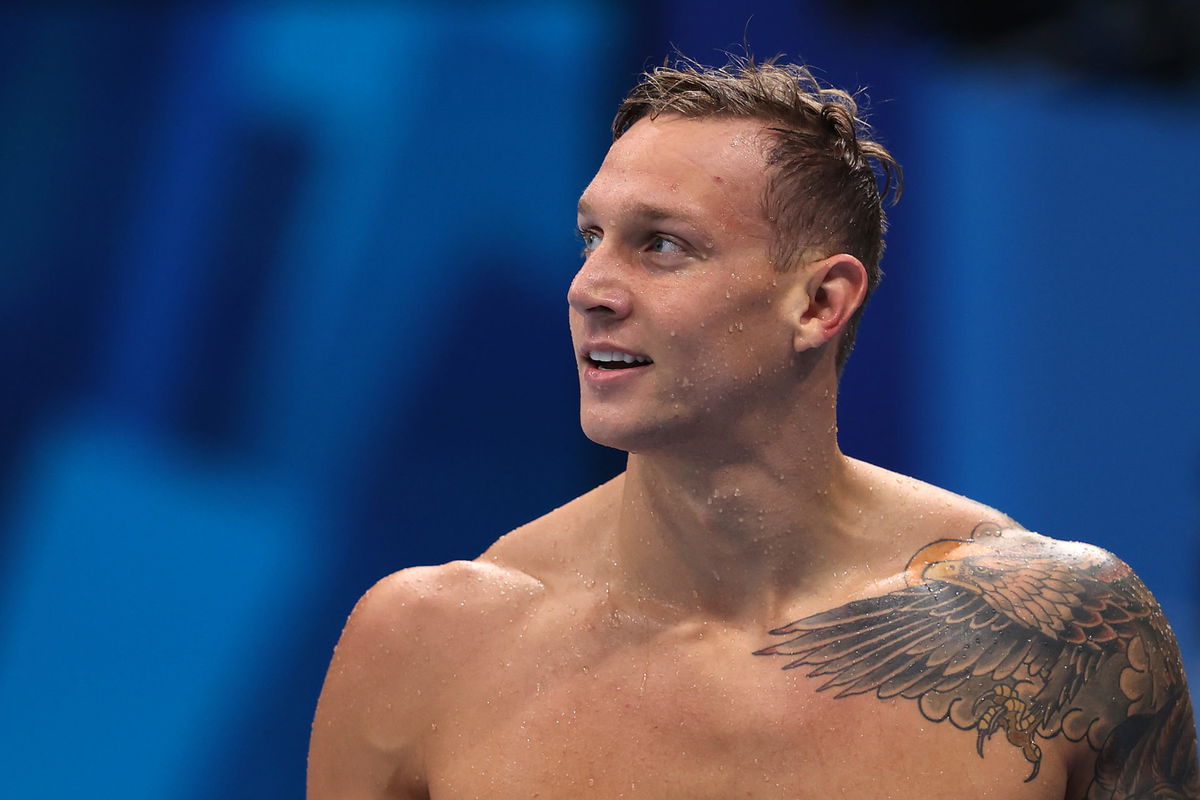
Getty
TOKYO, JAPAN – AUGUST 01: Caeleb Dressel of Team United States looks on after winning the gold medal and breaking the olympic record in the Men’s 50m Freestyle Final on day nine of the Tokyo 2020 Olympic Games at Tokyo Aquatics Centre on August 01, 2021 in Tokyo, Japan. (Photo by Clive Rose/Getty Images)

Getty
TOKYO, JAPAN – AUGUST 01: Caeleb Dressel of Team United States looks on after winning the gold medal and breaking the olympic record in the Men’s 50m Freestyle Final on day nine of the Tokyo 2020 Olympic Games at Tokyo Aquatics Centre on August 01, 2021 in Tokyo, Japan. (Photo by Clive Rose/Getty Images)
“It’s officially happening! The International Swimming League is excited to announce our first event,” announced ISL via a press release. For many swimmers, it felt like more than just a competition; it was a chance to finally be recognized as professionals, not just Olympians waiting every four years for the spotlight. The ISL’s first season began in October 2019 with seven meets worldwide. Caeleb Dressel starred for the Cali Condors in the 19–20, setting short-course world records in the 50m freestyle (20.24) and 100m butterfly (47.78) while drawing sold-out crowds. But –
Watch What’s Trending Now!
But the ISL faced strong opposition from World Aquatics (formerly FINA), which saw it as a competitor to its events. In 2018, World Aquatics urged member federations not to cooperate with ISL. That year, swimmers Katinka Hosszú, Tom Shields, and Michael Andrew filed an antitrust lawsuit, claiming the governing body unlawfully blocked athletes from participating in ISL events. Well, that case is finally settled.
Swimswam made an Instagram post on September 8 informing that the lawsuit has been settled. The caption read, “World Aquatics President Husain Al Musallam said, “This lawsuit dates back to the previous management of FINA, and, regrettably, it has dragged on for so many years”.” FINA has been officially rebranded as World Aquatics in January 2023, following a vote at the FINA Extraordinary General Congress held on the eve of the 2022 Short Course World Championships in Melbourne, Australia. The settlement will benefit 263 swimmers.
ADVERTISEMENT
View this post on Instagram
World Aquatics is legally obligated to pay $4.6 million as part of the settlement. This fund is specifically allocated to compensate the 263 swimmers who were affected by the previous restrictions on participating in ISL events in 2018 and 2019. The important thing here is that the settlement is still pending approval from the judge. Between 2018 and 2019, World Aquatics (then FINA) had a rule that effectively prevented swimmers from participating in the International Swimming League (ISL) without risking their eligibility for Olympic and other sanctioned events.
Several high-profile swimmers faced significant challenges due to restrictions imposed by FINA. These restrictions led to the cancellation of the Energy for Swim meet in 2018. The swimmers argued that this rule denied them the chance to earn money from appearance fees and prize money in ISL competitions. In response, 263 athletes filed this lawsuit claiming this was an unlawful restriction on their ability to compete professionally.
ADVERTISEMENT
Olympic champions Katinka Hosszú, Tom Shields, and Michael Andrew were among the lead plaintiffs in the class action lawsuit filed in 2018. “On behalf of elite swimmers around the world, the plaintiffs charge FINA with unlawfully restraining competition in the market for top-tier international swimming competitions. Their lawsuit follows FINA’s crackdown against a two day competition that a new professional league planned to sponsor in Turin, Italy, in late December 2018,” the press release read.
It also read, “Organizers were forced to cancel that meet after FINA said it would ban from the Olympics any swimmer who swam in it. As result, swimmers lost the chance to compete for more prize money and were blocked from earning appearance fees.” Initially, in 2019, FINA backed down from its ban threat against athletes participating in ISL following legal challenges. But there is still one lawsuit remaining.
ADVERTISEMENT
The legal battle between ISL and World Aquatics is not over yet
The press release also talked about one other lawsuit. It said, “In a simultaneous filing, the International Swimming League (“ISL”) separately sued FINA for its anticompetitive conduct. The ISL was responsible for coordinating the Turin event that FINA blocked, and it has plans to roll out a series of matches in 2019 featuring approximately 300 of the world’s best swimmers.” In simpler terms, the International Swimming League (ISL) also sued FINA separately because FINA tried to block them from holding events.
The lawsuit claims that World Aquatics’ restrictions led to the cancellation of the 2018 Energy for Swim meet in Turin, Italy. Swimmers argue that they lost at least $3.3 million in appearance fees and prize money, not only for that event but also for other ISL competitions that could have taken place if World Aquatics had not interfered. This lawsuit will move forward with a jury trial scheduled to run for eight days from January 12-22, 2026.
ADVERTISEMENT
The ISL operated for three seasons, starting with seven meets in 2019 and expanding to 13 and 18 events in 2020 and 2021. The league canceled its fourth season in 2022 due to the Russian invasion of Ukraine and never restarted. They have been trying to revive it, but the chances are very low. What do you think of the league, and also, do let us know your opinions on the settlement as well?
ADVERTISEMENT
ADVERTISEMENT
ADVERTISEMENT